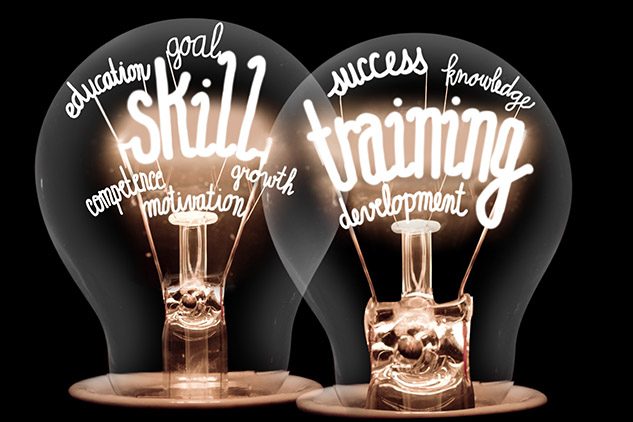Enhance Traditional Training with Digital Learning Platforms
Today’s employers need quick, effective solutions that boost conventional instruction to quickly prepare new employees for the field.

For years, effective, scalable training has been identified as a key element for businesses in the PHC industry to meet their most urgent challenges, including the chronic shortage of skilled trades labor. Leaders, managers, and technicians know training can help teams perform more efficiently and productively, but training challenges remain widespread throughout the service industries.
Employers routinely report a lack of time to train, confusion about the proper training methods and platforms, and a perceived lack of meaningful results. Many of them are frustrated by time-consuming traditional training methods, such as classroom training and on-the-job mentoring.
Traditional classroom learning and one-on-one training in the field provide valuable foundational knowledge that is essential to creating new generations of experienced skilled trades techs. But those traditional methods don’t always sync with today’s workflows and often don’t engage younger employees. In order to remain competitive, today’s employers need quick, effective solutions that enhance traditional training to quickly prepare new employees for the field.
How can employers build on the real benefits of traditional training to equip new employees with the critical skills they need to be job-ready faster?
The best strategy for effective, scalable training in today’s turbulent economic climate involves a base of traditional on-the-job training enhanced by innovative, flexible digital platforms that deliver a wide range of advantages and benefits, including allowing team members to train risk-free when they have time, at their own pace.
Drawbacks of Traditional Training
One of the most familiar training methods for the trades involves a one- or two-day offsite group classroom session. The training is in-depth, but techs may not see the specific techniques for weeks or even months. By the time they do, the in-depth training has worn off.
Additionally, these classrooms are often filled with people who have a wide range of skill levels, experience, and learning styles. It’s a one-size-fits-all approach that’s not customized to the needs of individual learners.
Traditionally, techs have learned from watching other, more experienced employees on the job. While there is great value in this style of learning — it offers the opportunity to see processes up close and ask questions — there are significant drawbacks, too. Techs don’t necessarily know the best practices for effective training and teaching. They may teach someone how to do something, but not why. They may pass on bad habits. Plus, it’s harder for techs to build the broad basic knowledge they need this way. They can’t learn more advanced skills until they have the proper foundation.
Digital Learning Solutions
Experts increasingly recognize that flexible, immersive technology-based learning works, especially when it’s integrated into an effective program of traditional on-the-job training. Providing online, hands-on simulations with customized training led by expert instructors is the most efficient method for building the foundational skills that new techs need and instilling confidence on the job site.
Digital learning platforms provide unique flexibility. Training programs can be personalized to meet each employee at their skill level. Training schedules can be threaded throughout a company’s workflow. Learning from experts simply becomes part of the job.
Because different employees bring different skill sets to the table, the most efficient training allows managers to customize pathways for each learner. With curated learning paths, technicians learn the right skills, in the right order. In addition, managers can identify skills gaps on their team and address them before they result in a callback. 24/7 access to field-like preventative maintenance and troubleshooting scenarios helps teams avoid downtime.
A program with broad offerings creates a one-stop shop that can offer greater value and increased efficiency. Learners can take advantage of a wide variety of courses while utilizing the same platform, enabling them to gain new skills and learn new equipment types. Employees who are cross-trained can fill in when others are out, maintaining service levels.
Crucially, the most trusted digital platforms not only offer a variety of course options focused on workplace safety, but they also embed safety into all their offerings.
In addition to specific training content, effective digital training programs include accurate assessments to identify skill gaps and measure what learners know before and after training. They also track the training techs are using and when they use it.
Digital learning is increasingly important for many companies’ recruiting efforts. An overwhelming majority of employees in a recent survey (bit.ly/42TC1XX) prefer flexible on-the-job digital training to more traditional methods.
Training has evolved significantly in recent years. A growing number of employers now recognize the importance of ongoing training, and many of them are embracing its benefits. As the industry accepts the advantages of ongoing training for recruiting, ramping and retaining a successful team, choosing the right training solutions for your company becomes even more important.
The immediate goal of training is to get technicians job ready and to provide ongoing opportunities for them to advance their skills. The long-term goal is to improve performance, productivity and efficiency to drive profitability.
Whatever training program a contractor decides to implement, it’s important to know why you’re doing it. Training just to train won’t drive results. The reason we train is to instill the skills technicians need to help companies grow.
Ken Midgett serves as the plumbing market director at Interplay Learning. He has been in the plumbing and heating industry for over 40 years and has worked in every facet of the industry. Ken has owned two successful PHC businesses, is a licensed master plumber and is a two-time national award-winning educator in plumbing and heating CTE classrooms.




